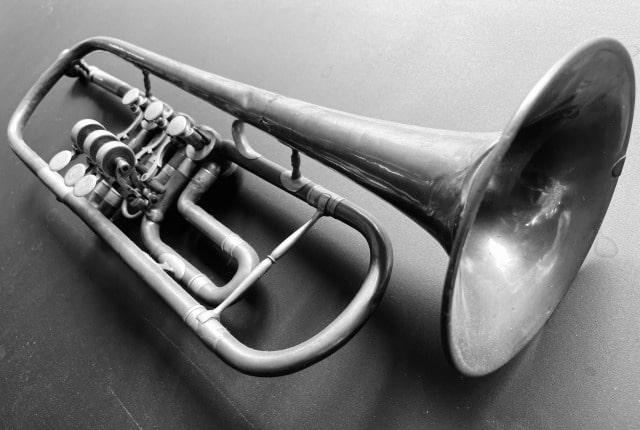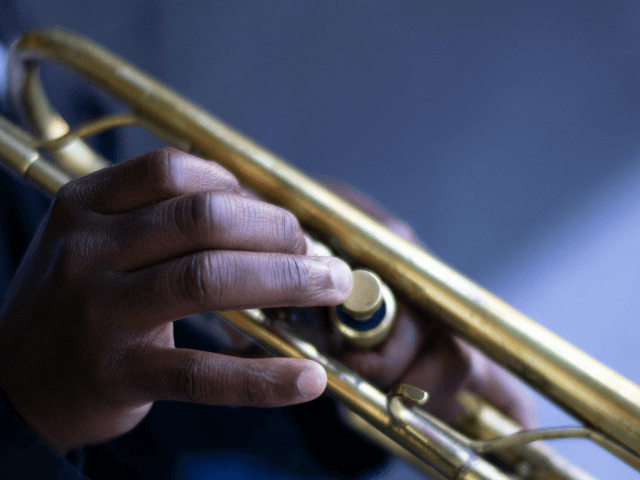When we hear someone playing the trumpet, or think of a trumpet, we immediately get reminded of epic fanfares, historical battles, or maybe just Robin Hood (which is equally epic). Unfortunately, the way to such epic playing skills is long and not always smooth. Here are the 5 worst things that can occur when playing the trumpet – and how you can avoid them!
1. Injuring your lips
Have you ever gotten tired, or felt your lips going numb from blowing up all those balloons for birthday? Well, now imagine you were blowing balloons made out of steel, and you will barely begin to understand how trumpet players feel.
Playing the trumpet involves a lot of air blowing, and a lot of intense, prolonged, and precise air blowing at that. Obviously, this is done with some of the most fragile parts of the human body – the mouth and the lips (the lungs as well, but we will cover that below). And what is scarier still, is that these softies, the lips have to be in almost constant high-pressure contact with the (usually metallic) mouthpiece of the instrument.
It is no wonder that many trumpeters often suffer from lip injuries, at least until they become better at it and develop a better technique. Hurting your lips while playing the trumpet occurs because you are either using too much pressure, or having a bad technique.
The key to solving this and avoiding injuries is to develop a proper embouchure (the way you position your mouth and lips while playing), so you will be able to both play better, keep your lips intact, and keep yourself less tired.
Looking for a teacher?
Want to get lessons at the comfort of your own home? Check out the course Learn to Play the Trumpet: Beginner to Pro Made the Easy Way* on Udemy! (See their full trumpet course line-up here*!)
The most common recommendation is to place an equal portion of both your lower and upper lips on the mouthpiece, so a balance is achieved when the pressure gets applied to the lips. However, everyone’s mouth is slightly different, so you should ultimately go with whatever feels the most comfortable for you.
However, avoid an extreme imbalance between the lips, and of course – don’t blow that hard! Relax. Reducing the pressure on the mouthpiece will help you avoid injuries.
2. Hypersensitivity Pneumonitis
Recently discovered, hypersensitivity pneumonitis can occur among all brass instrument players, not just the trumpet players, but those who play the tuba or the saxophone as well. For a while, it was believed that this was just a more intense case of a rare allergic reaction to brass metal, because of the similarity of the symptoms, which involve coughing, shortness of breath, and occasionally fever.
However, new research has revealed that the hypersensitivity pneumonitis is in fact caused by a buildup of mold and bacteria inside the wind instruments, which is then inhaled by the musicians unwittingly. Those tiny particles pile up and get trapped in the airways, which causes the lungs to inflame and become super sensitive. If left untreated, this can lead to even more dangerous conditions like fibrosis.
Bad news indeed, no? Well, here’s the good news: it’s actually pretty simple to prevent this from happening. There are three things you need to do in order to stay safe. First: always clean your instrument every day. No skipping. An afflicted trumpet player discovered that his cough vanished immediately after he drowned his trombone in a solution of isopropyl alcohol – which drowned all the bacteria as well. So, daily clean-ups, with alcohol.
Second, take care to practice in well air-conditioned rooms. The hypersensitivity pneumonitis is usually more common in humid, hot climates, where moisture helps bacteria settle inside your wonderful instruments way more easily. They’re basically vacationing in there, eeew. So don’t hesitate to spoil the weather for them and send them packing. And thirdly, avoid playing the trumpet after having eaten. A tasty mouth is a bacteria-infested mouth, so don’t infect your bacteria with your own germs – they’re harmless in your mouth, but dangerous in the tube. So always brush your teeth and use mouthwash before practicing.
3. Metal Allergies
Brass, gold, silver, nickel, raw brass, chrome, stainless steel… You name it. All of these metallic elements and metal alloys are used to make mouthpieces for most trumpets. And, unsurprisingly, prolonged lip exposure to them often leads to nasty, and hurtful allergies. Symptoms include itching, small bumps, loss of sensation in the lips and mouth and even muscle issues.
A cure? There isn’t any. Well, not for not being allergic to whatever you are already allergic. But, there is a solution – a plastic mouthpiece, or a mouthpiece of a material different from the metal you’re allergic to. These can also be useful in determining if you’re allergic to your old mouthpiece or not – just use the new, plastic (best choice) mouthpiece for a period of time, and if the reactions subside, you’re almost certainly allergic. And, please do yourself a favor and visit the doctor.
4. Physical Exhaustion
Sure, the violin or the piano may be one of the most difficult instruments to master, but they mostly demand mental agility and physical coordination. The trumpet, however, needs that, plus some very intense physical straining. Playing the trumpet is physically challenging.
This is why most trumpet players struggle with the trumpet regardless of the years under their belt. Additionally, in order to be a trumpet player, a person needs to have strong lungs, strong cheeks and strong lip muscles. Without this, they can’t execute all those loud and high passages everyone wants out of them. Fanfares are hard work!
Similarly, playing the trumpet is exhausting for your hearing as well and your ears might hurt after playing for a while. The good news: You can protect your hearing very well with musician ear plugs to prevent damage and hearing loss in the long term.
5. Mental Exhaustion
The fingering of the trumpet is deceivingly simple – the three keys means it is actually more complex to put out all those notes. It’s like trying to write a love letter with only half the letters of the alphabet.
And last, but not least – trumpet players barely see anything at all when they play, the least of which is their music sheet. It takes a lot of ingenuity to master this, but hey – trumpet players are heroes, remember?

Related Posts:
- Complete Guide to Trumpet Stands
- The Best Trumpet Cases (An Illustrated Guide)
- How To Practice The Trumpet Quietly
- Top 3 Trumpet Maintenance Tips
- Trumpet Parts (An Illustrated Guide)
TrumpetHub.com is a participant of the Amazon Services LLC Associates Program, an affiliate advertising program. Links marked with an asterisk (*) are affiliate links. If you buy a product through an affiliate link, we will get a small commission without extra cost to you. This helps us earn an income off the free content we provide to you. Thank you for your support!







